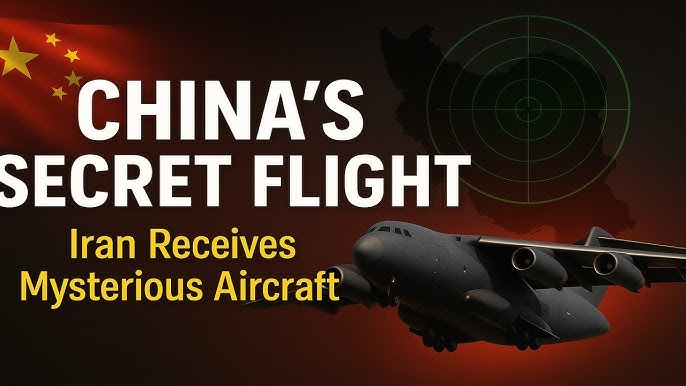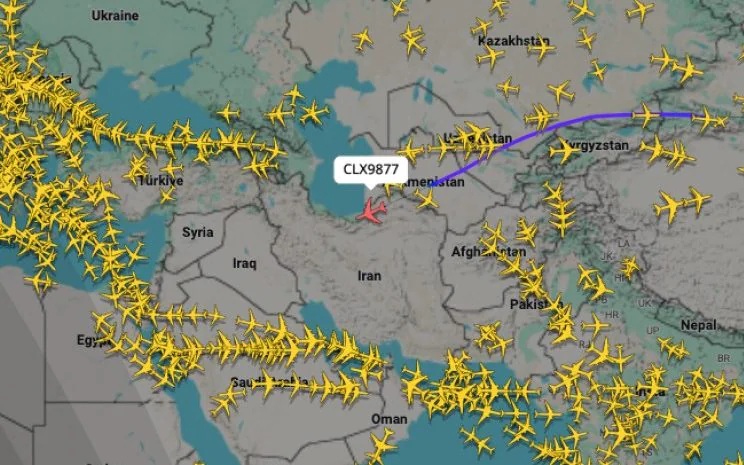
China Secret Flight to Iran
A cargo plane flew out of China the day after Israel attacked Iran on Friday. The next day, another plane flew from a coastal city. Then, on Monday, another flight took off, this time from Shanghai, bringing the total to three flights in three days.
Data showed that on each flight, the plane flew westward along northern China, crossing into Kazakhstan, then south into Uzbekistan and Turkmenistan, before disappearing from radar as it approached Iran.

To add to the mystery, flight data listed Luxembourg as the destination, yet the plane never reached European airspace. Meanwhile, as Iran’s war with Israel drags on, experts are raising alarms about China’s possible support for Tehran.
Notably, aviation analysts highlighted that Boeing 747 freighters often carry weapons or government-linked military cargo. Therefore, the aircraft’s type immediately triggered suspicions about the nature of what it might be delivering.
“These cargoes spark intense curiosity,” said Andrea Ghiselli, a China–Middle East expert at the University of Exeter. He explained that many expect China to assist Iran in some capacity, given their growing strategic alignment.
US-led Global Order
Additionally, China and Iran both oppose the US-led global order and advocate for a new, multipolar diplomatic model. As a result, observers believe this shared stance may drive covert cooperation, especially during heightened regional conflict.
Although no evidence confirms weapon transfers, the circumstances have raised legitimate concerns across international defense circles. Consequently, the unexplained flight path only deepens the speculation about what China might be sending to support Iran.
Iran is also one of China’s major energy suppliers, sending up to two million barrels of oil per day, so it’s not surprising that Beijing is investigating how to support and stabilize the Islamic Republic.
“The collapse of the current regime would be a significant blow and would generate a lot of instability in the Middle East, ultimately undermining Chinese economic and energy interests,” Mr. Ghiselli warned. Moreover, many people in Iran are likely expecting some form of assistance from China.
Missile Materials
Despite international criticism, China has a history of supplying Iran, including sending thousands of tons of ballistic missile materials that could be used in Iran’s nuclear weapons development. Experts believe Beijing will exercise caution in this critical situation.
Getting directly involved in the Iranian-Israeli conflict could jeopardize any efforts China makes to improve its relations with the United States, which is Israel’s strongest ally. Beijing is still reeling from its high-stakes trade war with Washington.
“The presence of Chinese military hardware would make that impossible, especially as there are already some that are pushing for the US to join the war as well as contain China by attacking Iran,” Mr. Ghiselli noted.

“The likelihood remains low” of China overtly sending defense materials to Tehran. Tuvia Gering, a China and Middle East specialist at Israel’s Institute of National Security Studies, said the possibility “should not be dismissed” and “must be closely monitored.”
Independent inspections are necessary to determine the cargo planes’ contents. According to publicly available flight data, some of the aircraft appear to take off from the same area along the Turkmen-Iran border and travel to Luxembourg on subsequent flights.
Cargolux
Cargolux, based in Luxembourg, claimed the flights avoided Iranian airspace but declined to reveal details about the cargo onboard. Although cargo manifests must list dangerous goods, these documents are not public and can sometimes include false or misleading information.
Previously, European authorities intercepted Chinese shipments labelled as turbine parts that actually contained drone components. This suggests a deliberate tactic—using commercial disguises to move military hardware under the radar of international scrutiny.
Additionally, a Telegraph investigation revealed that China tried to send $1 billion in drones to Libya last year. China allegedly routed this deal through shell companies in the UK, Tunisia, and Egypt to trade weapons for oil.
Therefore, experts now fear that Iran-bound shipments might use similar tactics. As global tensions rise, covert arms transfers risk escalating regional instability and complicating international diplomatic efforts.
The pattern of deceit and secrecy raises legitimate concerns in the defense and intelligence communities, even in the face of official silence. Consequently, the nature of these recent cargo flights deserves closer scrutiny by international watchdogs and security agencies.
References
- The Telegraph— China’s military cargo flights to Iran spark concern
- Reuters—China-Iran relations and strategic partnership
- Al Jazeera—Iran-Israel conflict updates
- FlightRadar24—Flight tracking data for China-Iran routes
- The Diplomat—China’s quiet involvement in Middle Eastern conflicts
- Institute for National Security Studies – Tuvia Gering’s analysis







